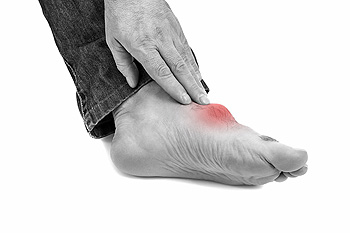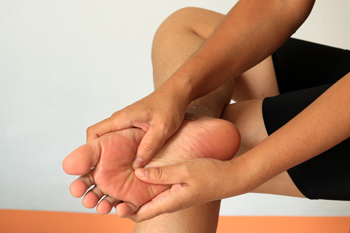Items filtered by date: December 2020
How Gout Can Develop
 Common symptoms that are often associated with gout can include severe pain and discomfort in the big toe, as well as swelling and redness. Gout is a form of inflammatory arthritis caused by a buildup of uric acid crystals in the joints. The body produces uric acid when it breaks down purines, which are naturally found in the body, but they are also found in certain foods and drinks. Some examples of foods that are rich in purines are shellfish, red meat, organ meats such as liver and kidney, processed meat, beverages that contain high fructose corn syrup, and beer. Many patients experience gout attacks that can be so debilitating it may be impossible to walk or complete daily activities. If you are afflicted with bouts of gout, it is strongly suggested that you speak to a podiatrist who can offer various treatment techniques. Although there is no cure for gout there are medications to manage it, as well as lifestyle changes to reduce and possibly eliminate attacks.
Common symptoms that are often associated with gout can include severe pain and discomfort in the big toe, as well as swelling and redness. Gout is a form of inflammatory arthritis caused by a buildup of uric acid crystals in the joints. The body produces uric acid when it breaks down purines, which are naturally found in the body, but they are also found in certain foods and drinks. Some examples of foods that are rich in purines are shellfish, red meat, organ meats such as liver and kidney, processed meat, beverages that contain high fructose corn syrup, and beer. Many patients experience gout attacks that can be so debilitating it may be impossible to walk or complete daily activities. If you are afflicted with bouts of gout, it is strongly suggested that you speak to a podiatrist who can offer various treatment techniques. Although there is no cure for gout there are medications to manage it, as well as lifestyle changes to reduce and possibly eliminate attacks.
Gout is a painful condition that can be treated. If you are seeking treatment, contact one of our podiatrists from Parkwood Podiatry. Our doctors will treat your foot and ankle needs.
What Is Gout?
Gout is a form of arthritis that is characterized by sudden, severe attacks of pain, redness, and tenderness in the joints. The condition usually affects the joint at the base of the big toe. A gout attack can occur at any random time, such as the middle of the night while you are asleep.
Symptoms
- Intense Joint Pain - Usually around the large joint of your big toe, and it most severe within the first four to twelve hours
- Lingering Discomfort - Joint discomfort may last from a few days to a few weeks
- Inflammation and Redness -Affected joints may become swollen, tender, warm and red
- Limited Range of Motion - May experience a decrease in joint mobility
Risk Factors
- Genetics - If family members have gout, you’re more likely to have it
- Medications - Diuretic medications can raise uric acid levels
- Gender/Age - Gout is more common in men until the age of 60. It is believed that estrogen protects women until that point
- Diet - Eating red meat and shellfish increases your risk
- Alcohol - Having more than two alcoholic drinks per day increases your risk
- Obesity - Obese people are at a higher risk for gout
Prior to visiting your podiatrist to receive treatment for gout, there are a few things you should do beforehand. If you have gout you should write down your symptoms--including when they started and how often you experience them, important medical information you may have, and any questions you may have. Writing down these three things will help your podiatrist in assessing your specific situation so that he or she may provide the best route of treatment for you.
If you have any questions, please feel free to contact our offices located in Brunswick and Hinesville, GA . We offer the newest diagnostic and treatment technologies for all your foot care needs.
Who Should Be Under the Care of a Podiatrist?
 There are a variety of injuries and issues that can affect the feet. Therefore, proper foot care is important, and those who have diabetes, arthritis, or poor blood flow should be under the care of a podiatrist. Common foot issues that podiatrists can care for include ligament sprains, broken bones, heel pain, warts, athlete’s foot, and ingrown toenails. They can prescribe medications for these foot-related issues, perform surgery, prescribe orthotics, and provide recommendations and solutions for your particular foot problem. Those who are older should be under the care of a podiatrist as well, because as the feet age, a variety of issues, such as bunions, arthritis, or foot pain, may become more prominent and can lead to falls. If you are in one of these risk groups, or believe that you have injured your foot, it is highly recommended that you are under the care of a podiatrist.
There are a variety of injuries and issues that can affect the feet. Therefore, proper foot care is important, and those who have diabetes, arthritis, or poor blood flow should be under the care of a podiatrist. Common foot issues that podiatrists can care for include ligament sprains, broken bones, heel pain, warts, athlete’s foot, and ingrown toenails. They can prescribe medications for these foot-related issues, perform surgery, prescribe orthotics, and provide recommendations and solutions for your particular foot problem. Those who are older should be under the care of a podiatrist as well, because as the feet age, a variety of issues, such as bunions, arthritis, or foot pain, may become more prominent and can lead to falls. If you are in one of these risk groups, or believe that you have injured your foot, it is highly recommended that you are under the care of a podiatrist.
If you are dealing with pain in your feet and ankles, you may want to seek help from a podiatrist. Feel free to contact one of our podiatrists from Parkwood Podiatry. Our doctors can provide the care you need to keep you pain-free and on your feet.
What Is a Podiatrist?
A podiatrist is a doctor of podiatric medicine who diagnoses and treats conditions of the foot, ankle, and related structures of the leg. Your podiatrist may specialize in a certain field such as sports medicine, wound care, pediatrics, and diabetic care. Podiatrists have the ability to become board certified through training, clinical experience, and then taking an exam.
What Do Podiatrists Do?
On a daily basis, a podiatrist may perform the following activities:
- Diagnose foot ailments such as ulcers, tumors, fractures, etc.
- Use innovative methods to treat conditions
- Use corrective orthotics, casts, and strappings to correct deformities
- Correct walking patterns and balance
- Provide individual consultations to patients
It is very important that you take care of your feet. It’s easy to take having healthy feet for granted, however foot problems tend to be among the most common health conditions. Podiatrists can help diagnose and treat a variety of feet related conditions, so it is crucial that you visit one if you need assistance.
If you have any questions please feel free to contact our offices located in Brunswick and Hinesville, GA . We offer the newest diagnostic and treatment technologies for all your foot and ankle needs.
Do You Suffer From Painful Feet?
Sever's Disease and Heel Pain in Children
 Sever’s disease is a common issue that leads to heel pain in children between the ages of 8 and 14. Sever’s disease occurs when the bones in the calves grow faster than the Achilles tendon, which connects the heel bone to the calf muscle. This causes the tendon to tighten and the heel to become swollen and sore. Sever’s disease symptoms are typically most prominent during running or jumping activities. However, there is usually no long term damage caused by Sever’s disease as the child continues to grow. Common symptoms include limping, tenderness in the heel, especially after exercise, and swelling in the heel bone. If you believe that your child is struggling with Sever’s disease, consulting with a podiatrist is suggested.
Sever’s disease is a common issue that leads to heel pain in children between the ages of 8 and 14. Sever’s disease occurs when the bones in the calves grow faster than the Achilles tendon, which connects the heel bone to the calf muscle. This causes the tendon to tighten and the heel to become swollen and sore. Sever’s disease symptoms are typically most prominent during running or jumping activities. However, there is usually no long term damage caused by Sever’s disease as the child continues to grow. Common symptoms include limping, tenderness in the heel, especially after exercise, and swelling in the heel bone. If you believe that your child is struggling with Sever’s disease, consulting with a podiatrist is suggested.
Sever's disease often occurs in children and teens. If your child is experiencing foot or ankle pain, see one of our podiatrists from Parkwood Podiatry. Our doctors can treat your child’s foot and ankle needs.
Sever’s Disease
Sever’s disease is also known as calcaneal apophysitis, which is a medical condition that causes heel pain I none or both feet. The disease is known to affect children between the ages of 8 and 14.
Sever’s disease occurs when part of the child’s heel known as the growth plate (calcaneal epiphysis) is attached to the Achilles tendon. This area can suffer injury when the muscles and tendons of the growing foot do not keep pace with bone growth. Therefore, the constant pain which one experiences at the back of the heel will make the child unable to put any weight on the heel. The child is then forced to walk on their toes.
Symptoms
Acute pain – Pain associated with Sever’s disease is usually felt in the heel when the child engages in physical activity such as walking, jumping and or running.
Highly active – Children who are very active are among the most susceptible in experiencing Sever’s disease, because of the stress and tension placed on their feet.
If you have any questions, please feel free to contact our offices located in Brunswick and Hinesville, GA . We offer the newest diagnostic and treatment technologies for all your foot and ankle injuries.
Risk Factors for Developing Neuropathy
 Neuropathy occurs when nerves that are in the feet or hands become damaged. Common symptoms of neuropathy include a sense of numbness or tingling, burning or stabbing pain, a loss of balance, and muscle weakness in the feet. Those who are older, have a family history of neuropathy, are malnourished, or have preexisting conditions like diabetes or cancer, are at a higher risk for developing neuropathy. Treatment options for this condition may include a nutritional plan, pain medications, or physical therapy. If you believe that you are afflicted with neuropathy it is important to consult with a podiatrist for proper treatment.
Neuropathy occurs when nerves that are in the feet or hands become damaged. Common symptoms of neuropathy include a sense of numbness or tingling, burning or stabbing pain, a loss of balance, and muscle weakness in the feet. Those who are older, have a family history of neuropathy, are malnourished, or have preexisting conditions like diabetes or cancer, are at a higher risk for developing neuropathy. Treatment options for this condition may include a nutritional plan, pain medications, or physical therapy. If you believe that you are afflicted with neuropathy it is important to consult with a podiatrist for proper treatment.
Neuropathy
Neuropathy can be a potentially serious condition, especially if it is left undiagnosed. If you have any concerns that you may be experiencing nerve loss in your feet, consult with one of our podiatrists from Parkwood Podiatry. Our doctors will assess your condition and provide you with quality foot and ankle treatment for neuropathy.
What Is Neuropathy?
Neuropathy is a condition that leads to damage to the nerves in the body. Peripheral neuropathy, or neuropathy that affects your peripheral nervous system, usually occurs in the feet. Neuropathy can be triggered by a number of different causes. Such causes include diabetes, infections, cancers, disorders, and toxic substances.
Symptoms of Neuropathy Include:
- Numbness
- Sensation loss
- Prickling and tingling sensations
- Throbbing, freezing, burning pains
- Muscle weakness
Those with diabetes are at serious risk due to being unable to feel an ulcer on their feet. Diabetics usually also suffer from poor blood circulation. This can lead to the wound not healing, infections occurring, and the limb may have to be amputated.
Treatment
To treat neuropathy in the foot, podiatrists will first diagnose the cause of the neuropathy. Figuring out the underlying cause of the neuropathy will allow the podiatrist to prescribe the best treatment, whether it be caused by diabetes, toxic substance exposure, infection, etc. If the nerve has not died, then it’s possible that sensation may be able to return to the foot.
Pain medication may be issued for pain. Electrical nerve stimulation can be used to stimulate nerves. If the neuropathy is caused from pressure on the nerves, then surgery may be necessary.
If you have any questions, please feel free to contact our offices located in Brunswick and Hinesville, GA . We offer the newest diagnostic and treatment technologies for all your foot care needs.

